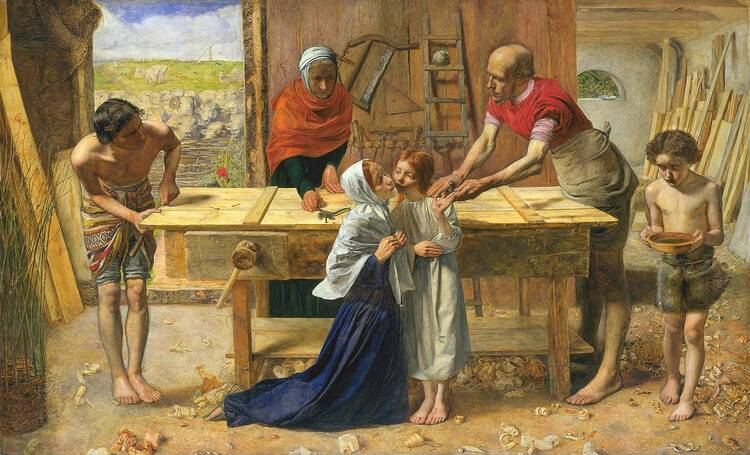Shortly after Sept. 11, 2001, Queen Elizabeth II, offering her condolences to the people of the United States, wrote: “My thoughts and prayers are with you all now, and in the difficult days ahead. But nothing that can be said can begin to take away the anguish and the pain of these moments.” But then she added a much-needed, quite maternal insight: “Grief is the price we pay for love.”
The church does not celebrate the Holy Family to set Jesus, Mary and Joseph above the shortcomings of our own families. None of us come from families composed of a saint and two utterly sinless souls; all of us come from families that do not measure up; and most all of us come from families marked by some shame. This feast does not exist to make us feel even worse.
The church does not celebrate the Holy Family to set Jesus, Mary and Joseph above the shortcomings of our own families.
If we have lived long at all, we know that no one can love us like family, and no one can hurt us like family. And this is as true of the Holy Family as it is of our own. Indeed, pondering the Holy Family reveals the depth of Queen’s Elizabeth’s words, “Grief is the price we pay for love.”
When Joseph and Mary bring their newborn to the Temple, Simeon warns the mother:
Behold, this child is destined
for the fall and rise of many in Israel,
and to be a sign that will be contradicted
—and you yourself a sword will pierce—
so that the thoughts of many hearts may be revealed (Lk 2:34-35).
Scripture scholars typically do not follow Christian piety in seeing this as a prophecy of Mary’s future suffering. They understand Simeon to be saying that a sword of division will enter her heart just as it must the heart of every disciple, compelling a choice for, or against, the Christ. Of course, the traditional and the exegetical readings might both be true. Mary chooses to cling to Christ in love, and, doing so in a fallen world, she suffers the consequences. “Grief is the price we pray for love.”
Mary chooses to cling to Christ in love, and, doing so in a fallen world, she suffers the consequences.
Consider the price she and her son pay. Mary watches her child die. Jesus dies brutally in front of his mother. Which is worse? No one loved Jesus more than his mother Mary. No one loved her more than he. Yet in a fallen world, the depth of their love became the very sounding of their suffering.
Dying before Calvary, Joseph escapes this terrible fate, of paying in grief for each fathom of love. We call him the patron of a happy death because he died with Jesus and Mary at his side. Yes, his death was signally blessed, but his life is marked by a searing pain.
While he lived with them, this greatest of saints stood outside the threshold of an inconceivable intimacy. Not being sinless, we cannot imagine the depth of love realized between these two, who cherished each other without any taint of sin. Mary, the creature, and Jesus, the uncreated Son of the Father, shared an intimacy that God had intended for all. Yet, after the Fall, it could be experienced by no one else. Despite all the joy he must have known in his mission, Joseph would have lived each day of his earthly life as the porter, the one who protects the door of the bridal chamber, never fully entering into the mysterious depths of God’s love, of God who is love.
Do not ponder this family in shame. Find instead a solace. No one can love us like family, and no one can hurt us like family. All of us know how right the queen was. “Grief is the price we pay for love.” Surely then, in this fallen world, we can find consolation, knowing that even this family, which we so rightly call holy, paid the very same price.
Readings: Genesis 15:1-6; 21:1-3 Colossians 3:12-17 Luke 2:22-40











I certainly have caused grief to the ones I love, especially my late Dad and my Mom. I attempted suicide in 1982 because of being depressed because I'm gay. However, I became convinced that my life was worth living because my good friends, who were unmarried when she became pregnant at age 17, needed assistance with caring for their baby . Fortunately, my friends did marry nine months after their son was born. Since Mary was unmarried when she conceived by the power of the Holy Spirit, Joseph wanted to quietly divorce her, but was told by an angel. in a dream that he should marry Mary. Although my.Dad passed away, I still have the love of my family and friends even though they know. of my orientation. I do try my best to be a good man, and go to the Sacrament of Reconciliation each month with my compassionate pastor. I believe that families can be loving towards their gay children, just as the Holy Family showed great love, without condoning gay sex.